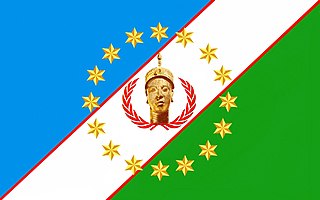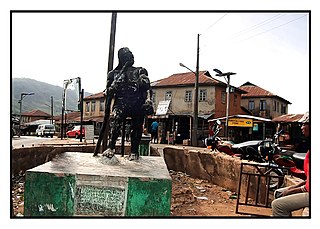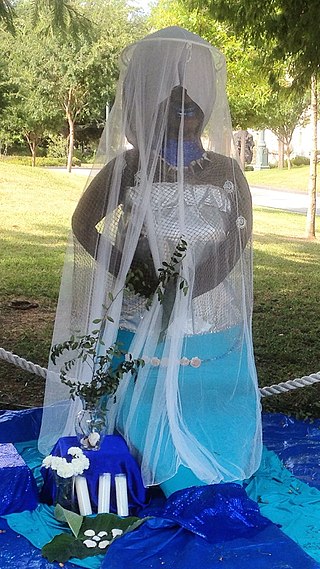Related Research Articles

Ogun or Ogoun is a spirit that appears in several African religions. He attempted to seize the throne after the demise of Obatala, who reigned twice, before and after Oduduwa, but was ousted by Obamakin and sent on an exile – an event that serves as the core of the Olojo Festival. Ogun is a warrior and a powerful spirit of metal work, as well as of rum and rum-making. He is also known as the "god of iron" and is present in Yoruba religion, Haitian Vodou, and West African Vodun.

Shango is an Orisha, a deity in Yoruba religion. Genealogically speaking, Shango is a royal ancestor of the Yoruba as he was the third Alaafin of the Oyo Kingdom prior to his posthumous deification. Shango has numerous manifestations, including Airá, Agodo, Afonja, Lubé, and Obomin. He is known for his powerful double axe (Oṣè). He is considered to be one of the most powerful rulers that Yorubaland has ever produced.

Oshun is an orisha, a spirit, a deity, or a goddess that reflects one of the manifestations of the Yorùbá Supreme Being in the Ifá oral tradition and Yoruba-based religions of West Africa. She is one of the most popular and venerated Orishas. Oshun is an important river deity among the Yorùbá people. She is the goddess of divinity, femininity, fertility, beauty, and love. She is connected to destiny and divination.

Olorun is the ruler of the Heavens in the Yoruba religion. The Supreme God or Supreme Being in the Yoruba pantheon, Olorun is also called Olodumare.
Olokun is an orisha spirit in Yoruba religion. Olokun is believed to be the parent of Aje, the orisha of great wealth and of the bottom of the ocean. Olokun is revered as the ruler of all bodies of water and for the authority over other water deities. Olokun is highly praised for their ability to give great wealth, health, and prosperity to their followers. Communities in both West Africa and the African diaspora view Olokun variously as female, male, or androgynous.
Èṣù is a pivotal Òrìṣà/Irúnmọlẹ̀ in the Yoruba spirituality known as ìṣẹ̀ṣe. Èṣù is a prominent primordial Divinity who descended from Ìkọ̀lé Ọ̀run, and the Chief Enforcer of natural and divine laws - he is the Deity in charge of law enforcement and orderliness. As the religion has spread around the world, the name of this Orisha has varied in different locations, but the beliefs remain similar.

Orishas are spirits that play a key role in the Yoruba religion of West Africa and several religions of the African diaspora that derive from it, such as Cuban, Dominican and Puerto Rican Santería and Brazilian Candomblé. The preferred spelling varies depending on the language in question: òrìṣà is the spelling in the Yoruba language, orixá in Portuguese, and orisha, oricha, orichá or orixá in Spanish-speaking countries.

Ifẹ̀ is an ancient Yoruba city in south-western Nigeria, recent in-depth archeologically estimates suggest Ife's founding to be between the 10th century BC and 6th century BC and is widely agreed upon by historians to be the oldest amongst the classical and post-classical Yoruba city-states. The city is located in present-day Osun State. Ife is about 218 kilometers northeast of Lagos with a population of over 500,000 people, which is the highest in Osun State according to population census of 2006.

Ijebu-Ode is a town in Ogun State, South Western geopolitical zone in Nigeria, close to the A121 highway. The city is located 110 km by road Northeast of Lagos; it is within 100 km (62 mi) of the Atlantic Ocean in the eastern part of Ogun State and possesses a warm tropical climate.

The Yoruba religion, or Isese, comprises the traditional religious and spiritual concepts and practice of the Yoruba people. Its homeland is in present-day Southwestern Nigeria, which comprises the majority of Oyo, Ogun, Osun, Ondo, Ekiti, Kwara and Lagos States, as well as parts of Kogi state and the adjoining parts of Benin and Togo, commonly known as Yorubaland. It shares some parallels with the Vodun practiced by the neighboring Fon and Ewe peoples to the west and to the religion of the Edo people and Igala people to the east. Yoruba religion is the basis for a number of religions in the New World, notably Santería, Umbanda, Trinidad Orisha, and Candomblé. Yoruba religious beliefs are part of Itàn (history), the total complex of songs, histories, stories, and other cultural concepts which make up the Yoruba society.

Babalú-Aye, Oluaye, Ṣọpọna, Ayé in Trinidad Orisha, or Obaluaiye, is one of the orishas or manifestations of the supreme creator god Olodumare in the Yoruba religion of West Africa. Babalú-Aye is the spirit of the Earth and strongly associated with infectious disease, and healing.

Christianity is the largest religion in Benin, with substantial populations of Muslims and adherents of traditional faiths. According to the most recent 2020 estimate, the population of Benin is 52.2% Christian, 24.6% Muslim, 17.9 Animist and 5.3% follows other faiths or has no religion.

The Yoruba people are a West African ethnic group who mainly inhabit parts of Nigeria, Benin, and Togo. The areas of these countries primarily inhabited by the Yoruba are often collectively referred to as Yorubaland. The Yoruba constitute more than 52 million people in Africa, are over a million outside the continent, and bear further representation among members of the African diaspora. The vast majority of the Yoruba population is today within the country of Nigeria, where they make up 21% of the country's population according to CIA estimations, making them one of the largest ethnic groups in Africa. Most Yoruba people speak the Yoruba language, which is the Niger-Congo language with the largest number of native or L1 speakers.

Okemesi-Ekiti is the local Government Headquarters of Okemesi/Idoile Local Government of Ekiti State, Nigeria, whose headquarters is the Ekiti town of Okemesi. Its population according to 2006 population census is 56,000 residents.
Distinctive cultural norms prevail in Yorubaland and among the Yoruba people.
Trinidad Orisha, also known as Orisha religion and Shango, is a syncretic religion in Trinidad and Tobago and the Caribbean, originally from West Africa. Trinidad Orisha incorporates elements of Spiritual Baptism, and the closeness between Orisha and Spiritual Baptism has led to use of the term "Shango Baptist" to refer to members of either or both religions. Anthropologist James Houk described Trinidad Orisha as an "Afro-American religious complex", incorporating elements mainly of traditional African religion and Yoruba and incorporates some elements of Christianity, Hinduism, Islam, Buddhism, Judaism, Baháʼí, and Amerindian mythologies.
Iyalawo is a term in the Lucumi religion that literally means Mother of Mysteries or Mother of Wisdom. Some adherents use the term "Mamalawo," which is a partially African diaspora version of the Lucumi term, Iyaláwo and Yeyelawo are two more versions of mother of mysteries. Ìyánífá is a Yoruba word that can be translated as Mother (Ìyá) has or of (ní) Ifá or Mother in Ifá & is the Yoruba title for Mother of mysteries & the female equivalent of a Babalawo.

Yemọja is a major water spirit from the Yoruba religion. She is the mother of all Orishas. She is an orisha, in this case patron spirit of rivers, particularly the Ogun River in Nigeria, and oceans in Cuban and Brazilian orisa religions. She is often syncretized with either Our Lady of Regla in the Afro-Cuban diaspora or various other Virgin Mary figures of the Catholic Church, a practice that emerged during the era of the Trans-Atlantic slave trade. Yemọja is said to be motherly and strongly protective, and to care deeply for all her children, comforting them and cleansing them of sorrow. She is said to be able to cure infertility in women, and cowrie shells represent her wealth. She does not easily lose her temper, but when angered she can be quite destructive and violent, as the flood waters of turbulent rivers.
Ilara-Mokin is located in a central part of Ifedore local government of Ondo State. Ilara-Mokin is about 12 km from Ondo state capital, and has Ipogun, Ipinsa, Ikota, Ibule-Soro and Ero as neighbouring towns.
References
- 1 2 Lynch, Patricia (May 1, 2010). African Mythology A to Z. Chelsea House Publications. ISBN 978-1604134155. Archived from the original on August 17, 2017.
- ↑ Abarry, Abu (1996). African Intellectual Heritage: A Book of Sources. Temple University Press. ISBN 1566394031.
- ↑ Duane, O.B. (2001). African Myths and Legends. Brockhampton Press. ISBN 1860193676.
- ↑ Ojo, Olatunji (2009). "'Heepa' (Hail) Òrìşà: The Òrìsà Factor in the Birth of Yoruba Identity". Journal of Religion in Africa. 39 (1): 30–59. doi:10.1163/157006609X408211. ISSN 0022-4200. JSTOR 20696795.
- ↑ Ojo, Olatunji (2008). "Beyond Diversity: Women, Scarification, and Yoruba Identity". History in Africa. 35: 347–374. doi:10.1353/hia.0.0015. ISSN 0361-5413. JSTOR 25483727. S2CID 162328247.
- ↑ Awolalu, J. Omosade (1973). "Yoruba Sacrificial Practice". Journal of Religion in Africa. 5 (2): 81–93. doi:10.2307/1594756. ISSN 0022-4200. JSTOR 1594756.
- ↑ "How Agemo festival put Ijebuland on hold for seven days - Vanguard News". Vanguard News. 2017-07-14. Retrieved 2018-09-08.